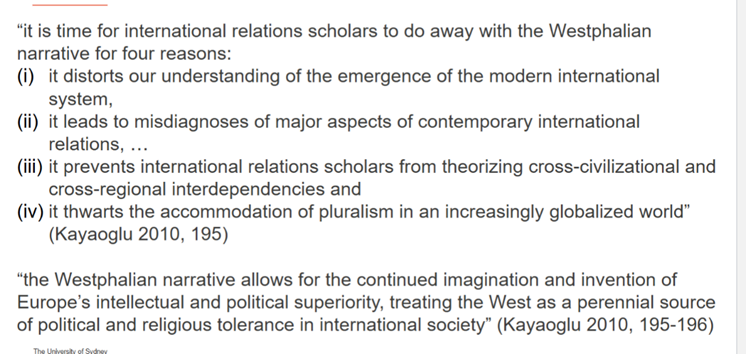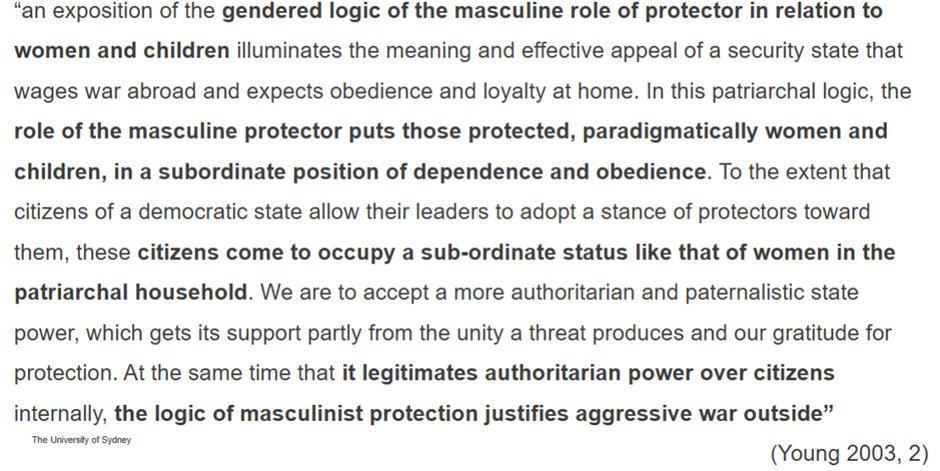week two: sovereignty and the modern state system
1/15
There's no tags or description
Looks like no tags are added yet.
Name | Mastery | Learn | Test | Matching | Spaced | Call with Kai |
|---|
No analytics yet
Send a link to your students to track their progress
16 Terms
What is a sovereign state, according to Dunn?
‘the principal institutional site of political experience’
What does a modern state refer to
an abstract entity comprising a government, population and a territory. while people come and go, the state is a ‘continuing structure of government, decision-making, legal interpretation and enforcement’
What does the Montevideo Convention on the Rights of States say is the criteria to be a state?
population
territory
government
recognition by other states.
What do Weber and Tilly etc, say the state is best defined by? In terms of functions?
the control and organisation of the force that underpins its rule. Tilly, ‘relatively centralised, differentiated organisations the officials of which more or less successfully claim control over the chief concentrated means of violence within a population inhabiting a large, contiguous territory.’
The right to enforce the law internally and provide security against external threats through the establishment of police and military forces.
How did Hobbes conceptualise the state
state of nature (no common power to keep them all in awe) → no peace → establishment of social contract.
sovereign power monopolises law through enforcement capacity, no higher earthly power than the state, including the church. state is made up of the people, head of state with reason of state and borders
Does state sovereignty imply a rejection of international law?
No, sovereign states acquire their rights in relation to evolving international rules and norms. States may sometimes ignore and breach international law, it has been built up around states.
How did sovereignty change the modern conception of politics?
authority, society and territory were coterminous. the jurisdiction of a political authority, and its related claim to the legitimate instruments of violence, was coextensive with the geographical limits of a society. sovereignty concentrated social, militial, economic political and legal life around a single site of governance, whether this was the power and authority vested in a prince or parliament, dynastic or popular.
Why does sovereignty continue to remain contentious
rulers may give the impression sovereignty is a licence to do anything they please, but this is far from the truth.
rulers are subject to national constitutions, and state sovereignty has always been governed by international rules and norms and is conditional upon international recognition.
What is an example of sovereignty being challenged within Australia?
the mabo case
What monopolies do states have?
instruments of legitimate force
national economic management
law making
international representation
border control
political loyalty
What is a common misconception about the start of IR?
The Westphalia
What are the two critiques of theory of Westphalia?
Two critiques of the theory of Westphalia
- Features often. Has incredible significance for explaining contemporary society.
§ “the discipline theorizes against the backdrop of a past that is largely imaginary ... ‘Westphalia’ – shorthand for a narrative purportedly about the seventeenth century – is really a product of the nineteenth- and twentieth-century fixation on the concept of sovereignty” (Osiander 2001: 251)
Postcolonial critique
- Our history of the discipline is anchored in the Euro;
o “To break with this imperialist imaginary, upon which the myth of 1648 ultimately rests, is to fundamentally confront the Eurocentric identity of the discipline” (de Carvalho et al. 2011: 757)
- Didn’t have to take exclusively this and label it as ‘most important event in IR’ – instead we’re eurocentralising it.
‘Although Eurocentrism has multiple incarnations, overall it can be described as the sensibility that Europe is historically, economically, culturally and politically distinctive in ways that significantly determine the overall character of world politics’
What are the avatars of Westphalia?
‘Avatars’ of Eurocentrism:
- culturalist
- historical
- epistemic
· If we keep purporting this myth, we get a distorted view of sovereignty and we will continue coming up with problematic views of IR. Keep marginalising
According to Kayoglu, why is Westphalia problematic?

What is the feminist critique of the state?
- Who was involved in signing the treaties? What ideas about authority etc did they embed? No significant female representative.
- State is a patriarchal construct
What does Young say about the problematic nature of Westphalia?
